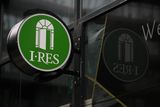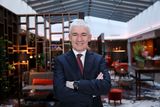Liam Casey emerges as backer of Oral Eye and Konnect Again
Serial investor talks about how supply-chain technology is going to be a game-changer
Liam Casey of PCH
PCH boss Liam Casey has emerged as a backer of alumni relations software company Konnect Again and dental check-up app Oral Eye.
His personal investment in the Irish software start-ups emerged in an interview with the Sunday Independent.
Casey, who has also backed payments firm Stripe, said his main criterion for investment is the quality of the entrepreneur. Konnect Again is the brainchild of UCC graduate Jayne Ronayne, while Oral Eye is run by Trinity graduate Mark Moore.
Casey, nicknamed 'Mr China', said his company hadn't been close to the stock market turmoil in that country. PCH provides custom manufacturing services to global clients - including Apple and Beats - and has its operational headquarters in Shenzhen in southeast China.
"It's been interesting to watch where some of the Chinese companies were listed in the US in the last couple of years, and then would have been de-listed in the US and re-listed in China. And with very little change to their operations their market cap would go up substantially. That's well documented, that's happened a lot.
"The interesting thing about the Chinese - the Chinese people - is that they invest on a daily basis in the stock. And for the last two years it's been interesting to watch where they've invested heavily, those regular punters. It's mainly in public companies.
"This year you've seen a big drop in some of the companies, we haven't been close to it because it's not in our space, but it definitely has had an impact on some of the punters who were investing. I think some of them were probably caught by surprise because the expectation has been on bull market for a long time.
"The other thing I think is that probably the government took action, they did what would have been done anywhere else to correct it. I think that there was a lot of focus on them, and I think this would have been their first time doing it so I think it's got a lot of attention."
Casey's company has been in business for almost 20 years. Last year, it posted revenues of over $1bn (€890m). But the business - founded in 1996 as a sourcing company - didn't take off until 2001.
"We learned very early on that if we weren't adding value we just should not be in the deals. And the value we started to add was being involved with companies that cared about design, they cared about their brand, and they cared about the consumer experience. With those three things, it allowed us to add value.
"If somebody didn't care about that, all we were ever going to do was add cost. And that was when we started to manage a lot of the processes for our customers. We had some great successes. From 2001 onwards we started to bring on some bigger clients."
He said his company will look to take advantage of new efficiencies in the supply-chain industry over the coming years.
"There's huge efficiencies going to happen in supply-chain in the next few years. The majority of those are going to happen in the next five. That's using technology that's existing today and applying it better. We're starting to engage with a lot more data tracking, data visualisation.
"It's about making less products - not more products, so it's real demand versus forecast. If you look at the way we've structured the supply chain, we're three hours from every factory we work with, and we're three days from 90pc of the consumers on the planet that buy the product.
"What that means is you need less inventory to meet global demand, rather than going out and saying: 'Okay, we're going to put all the inventory into warehouses in Europe, warehouses in Asia, warehouses in the US.'
"You don't do that, you keep it all in one location and use data to know where the demand is so you're able to ship much faster, much shorter cycles."
Many venture capitalists and domestic entrepreneurs have criticised Ireland's 33pc capital gains tax rate. Jobs Minister Richard Bruton has lobbied for a significant cut. But Casey says capital gain tax is "an up-market problem".
"Through entrepreneurship, you're not even going to have a conversation with a government. You'll find the best environment for your business, and you'll make it work. Great entrepreneurs are going to go out and they're going to find where the best place for them to be located is."
"I think first-time entrepreneurs are passionate about building a business. As for capital gains tax - that's an upmarket problem that you're going to have in the future.
"Teams are going to be the big thing at the start. Where are you going to get the like-minded, crazy people that will work with you, that will work through bootstrapping a company, work through taking the risk, work through chasing deals. It's that can-do attitude. The camaraderie and the entrepreneurship in the team, that's a big thing.
"I've never met the government in China. We don't interact with them at all. We fit into an export category that works and we never really get involved in it. I don't think they want to get involved with companies like us. They let you do what you do and that's it."
Join the Irish Independent WhatsApp channel
Stay up to date with all the latest news














